The Importance of Brand Inspections
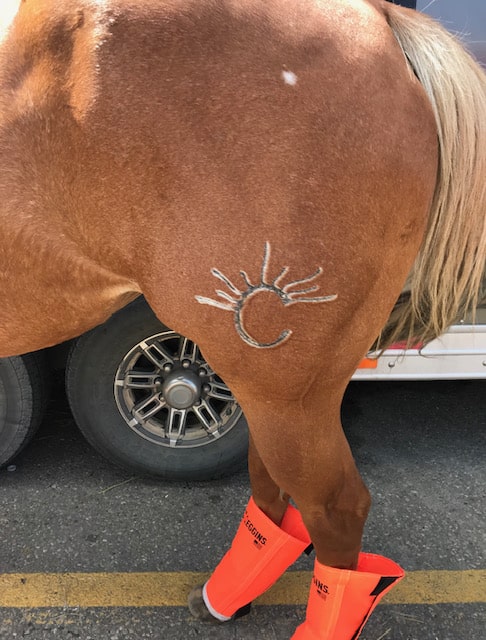
Unique Horse Brands [Photo: submitted]
“A lot of the people I work with are friendly and courteous and are unaware of the importance and the laws behind brand inspecting. The part of this job I like is getting to explain the process and help someone when I can. I’d rather have a livestock owner ask what to do and get them set up in the right direction, then not ask at all,” said Mark Kramer, 37-year veteran brand inspector in McHenry County.
“Branding livestock has been around for at least 4,700 years and likely longer. Studies show that the Egyptians were branding cattle as early as 2700 BC. The Spanish brought the practice to southern Mexico in the 1500s, and the earliest recorded brand in the U.S. was in Texas in 1832. There are some things that progress with time and are worth continuing to utilize and history shows that branding is a tried-and-true option for livestock identification,” according to North Dakota Chief Brand Inspector Corby Ward.
“There is nothing more definitive than an ownership brand. It is hard to dispute whose horse or cow it is when it’s carrying your brand,” said Ward.
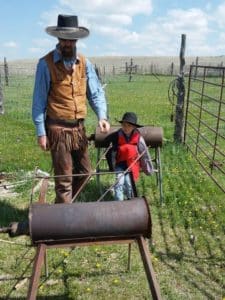
Corby Ward, North Dakota Chief Brand Inspector, doing what he loves [Photo: submitted]
“Brand inspections are not only a law in North Dakota, but they protect horse owners in the change of ownership or sale process. If these animals are branded, it is more of a tracking system and makes them easier to find if there are stolen, versus just having your registration papers,” added Kramer.
“A lot of horse owners don’t realize that this proof of ownership only costs $1.50 per head. With horses, a lifetime inspection costs $25 and you can travel anywhere, anytime in the U.S.,” said the brand inspector. Kramer also advised horse owners to check on each state’s or country’s health regulations for import and export of animals.
Kramer explained that every state is different in the U.S. when it comes to their laws and requirements for brand inspections. However, the paper trail from each state is extremely useful from the immediate change of hands of a horse. “Even when people are transporting horses for other people across state lines, it is really important that those horses be brand inspected to protect the owners,” Kramer stated.
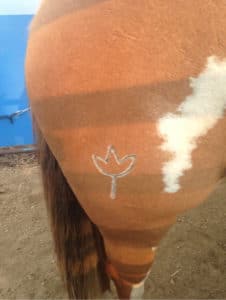
Horse Brand on right hip [Photo: submitted]
Before a horse leaves North Dakota’s state lines or as it moves through an auction market, a brand inspection is required – whether or not the horse is branded.
Kramer explained that each state has its own patrol people that can stop horse and stock trailers anytime to check paperwork. “There are different regulations at the border of Canada, so always check ahead, but a lifetime brand inspection usually gives you access to cross the border,” Kramer expressed.
“Horses are worth so much more than they used to be, even from five years ago. Having the proper paperwork in place only protects the investment of a horse further,” explained Kramer.
When looking into acquiring a brand, the North Dakota Stockmen’s Association website notes that each brand is individual to the position on the animal. Brands must be used exactly as pictured on the brand card in the exact location. Livestock sold or consigned any other way than how the brand is recorded will cause the brand inspector to hold the proceeds of the sale. The Stockmen’s Association advises to not order branding irons until you receive your brand card.
“It’s easy to get caught up in the moment, fall in love with a horse and money moves so quickly. When you find that perfect horse and purchase it, always make sure you get legal proof of ownership along with it,” said Kramer. North Dakota Century Code requires livestock sellers to provide purchasers legal proof of ownership within 15 days.
Kramer is a long-time member to the agriculture and livestock community of North Dakota. Born and raised in Denbigh, the cowboy was looking for a job opportunity when he first began this career.
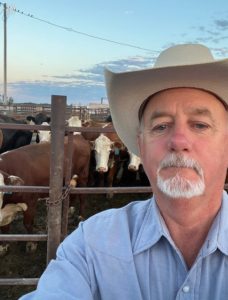
Kramer on the job [Photo: submitted]
Kramer explained that he has gotten to meet a lot of different people and have been in different circumstances along the way and finds that interesting. “I feel good when I get to help someone out with finding a paper trail or writing up a lifetime brand inspection,” confirmed Kramer.
Currently, Kramer resides in Granville where he farms and ranches on the side for some other locals, and he said working in agriculture and with livestock is just a way of life for him.
For more information or questions, visit ndstockmen.org or reach out to your local brand inspector.
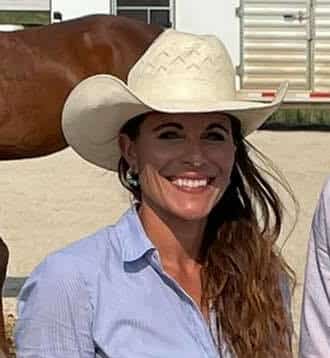
Tisa Peek is a long-time horse trainer, competitor in barrel racing and team roping, and writer about the equine. Rodeo and horses run deep in her roots. JT Family Equine is where she calls home, south of Bismarck, ND. Tisa, along with her husband, Jon, and boys, Blu and River, train horses and host clinics. Tisa is the host for Dakota Cowboy on BEK TV.
